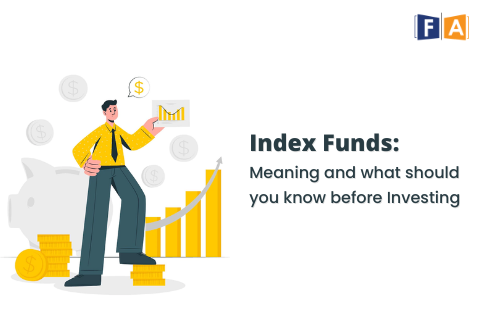
Index Funds: Meaning and what should you know before Investing
What is an index fund?
A mutual fund or exchange-traded fund that attempts to match the returns of a market index is known as an “index fund.” Index funds may strive to track market indexes such as the S&P 500 Index, the Russell 2000 Index, the SENSEX etc. to name a few.
A market index tracks the performance of a “basket” of securities (such as stocks or bonds) that is designed to reflect a Stock Market or economy sector. You can’t invest directly in a market index, but you can invest indirectly through index funds, which track said market index.
Tell us more!
To monitor a market index, index funds can use a variety of approaches: some invest in all of the securities included in the index, while others invest in simply a sample of the securities included in the index.
The market capitalisation of a firm is frequently used by market indexes to determine how much weight that securities will have in the index. The total worth of a company’s shares is measured by market capitalization (or “market cap”). The total value is calculated by multiplying the share price by the number of outstanding shares. Securities having a higher market capitalization value account for a larger percentage of the index’s overall value in a market-cap-weighted index. Some market indices are “price-weighted,” such as the Dow Jones Industrial Average. The weight of a security will be determined by its price per share in this situation.
Some index funds may also employ derivatives (such as options or futures) to aid in the achievement of their investing goals.
How do index funds make their investments?
Index funds have traditionally invested in a passive rather than active manner. This implies they want to optimise Long-Term gains by not purchasing and selling shares often. An actively managed fund, on the other hand, makes more frequent acquisitions and sells in order to beat the market (which is generally measured by some type of index). While an actively managed fund aims to outperform its benchmark, an index fund’s goal is to mirror its index’s performance. Index funds usually produce returns that are similar to the benchmark. However, there may be a little discrepancy in performance between the fund and the index. The tracking error is the term for this. The fund manager should make every effort to reduce the tracking mistake as much as feasible.
When an index fund follows a benchmark such as the Nifty, its portfolio will contain the same 50 stocks as the Nifty in the same proportions. A market sector is defined by an index, which is a collection of securities. Bond market instruments or equity-oriented instruments such as stocks are examples of these securities. BSE Sensex and NSE Nifty are two of India’s most popular indicators. Index funds are classified as passive fund management since they monitor a certain index. According to the composition of the underlying benchmark, the fund manager determines which equities must be acquired and sold.
What are the costs incurred by index funds?
Index funds may be able to save money since they employ a passive investment style. Index fund managers, for example, do not actively pick stocks and hence do not require the services of research analysts and others who assist in the selection of securities. This decrease in fund management costs might result in lower total costs for shareholders. Keep in mind, however, that not all index funds are less expensive than actively managed funds. Before investing in any fund, be sure you understand the true cost.
What are some of the dangers associated with index funds?
Index Funds, like any other investment, carry some risk. An index fund will be exposed to the same risks as the securities that make up the index it monitors. Other risks to which the fund may be exposed include:
Less flexibility: When it comes to reacting to price decreases in the securities in the index, an index fund may have less flexibility than a non-index fund.
More tracking errors: It’s possible that an index fund won’t exactly match its benchmark. For example, a fund might only invest in a subset of the securities in a market index, which means the fund’s performance is less likely to mirror the index’s.
Underperformance: Because of fees and expenditures, an index fund may underperform its benchmark.
You should thoroughly examine all of the fund’s accessible information before investing in it. Ask the following questions – What are the fees and expenditures associated with purchasing, owning, and selling this index fund? What are the unique risks that this index fund entails? How is the index composition of the fund determined? How well does the index fund’s investing strategy match my objectives?
Happy investing!





